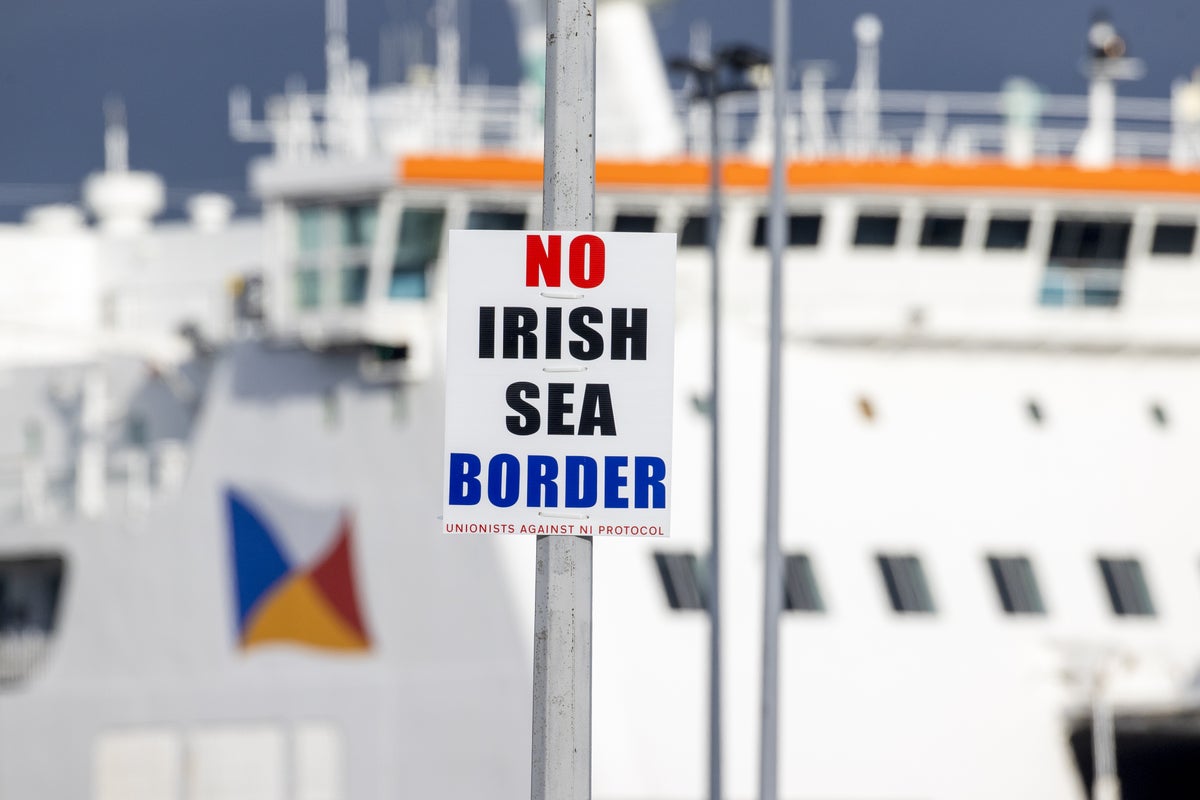
Boris Johnson has insisted his plans to tear up the complex trade arrangements agreed for Northern Ireland as part of his Brexit deal could happen “very fast” and be implemented before the end of the year.
Speaking from the G7 summit in Germany as MPs gathered to debate the controversial legislation aimed at overriding parts of the mechanism governing post-Brexit trade across the Irish Sea, Mr Johnson is already facing the prospect of new legal action from the European Union (EU) as well as a fresh rebellion from within his own party over the matter.
His revised Northern Ireland Protocol Bill, published on Monday 13 June, aims to grant ministers sweeping new powers to override an agreement he himself signed just three years ago, while also granting new powers to the UK over tax and state subsidies in the region without oversight from the EU.
The legislation has provoked a furious reaction in both Brussels and Dublin, with Irish premier Micheal Martin saying it was “very regrettable for a country like the UK to renege on an international treaty”.
A majority of members of the Northern Ireland Assembly, including all Sinn Fein, SDLP and Alliance representatives, signed a joint letter to the PM urging him to abandon his “reckless” rewrite of the protocol, which the government believes will ease the disruption to trade with mainland Britain following Brexit.
The EU’s chief negotiator Maros Sefcovic said that the UK’s initiative was “damaging to mutual trust” and would undermine the Trade and Cooperation Deal governing post-Brexit relations between the UK and EU, as well as calling into question Northern Irish businesses’ access to the European single market.
Even before the bill was presented earlier this month, a leaked briefing paper being shared among Conservative MPs described the moves, which experts warned could provoke a trade war with Europe, as “damaging to everything the UK and Conservatives stand for”.
Mr Johnson was also challenged to reveal the legal sources behind his decision-making after Sir Jonathan Jones, formerly the government’s top lawyer, said the process of gathering advice felt like a “stitch-up” and “like lawyer-shopping”.
Here is everything you need to know about the background to the controversy.
What is the Northern Ireland protocol?
The protocol was agreed as part of the Brexit deal — again, signed by Mr Johnson himself — and is designed to protect the Good Friday Agreement by avoiding a contentious hard border on the island of Ireland.
To allow goods to move freely between Northern Ireland and the Republic of Ireland and avoid that hard border, the former remained in the EU’s single market for goods.
But Northern Ireland also stayed in Great Britain’s market too because it remains part of the UK.
What is the Irish Sea border?
After Brexit, Northern Ireland’s border with the Republic also in effect became the UK's new border with the EU and, with the UK and EU now following different customs rules, a trade barrier became a matter of (awkward) necessity.
As a solution, the UK and EU government agreed to a deal that would see customs checks at Northern Ireland’s ports, creating a de facto border down the Irish Sea.
Why were the DUP and unionists unhappy with the new arrangements?
Since its implementation, disruption to trade has been seen because laborious checks are required on certain goods entering Northern Ireland from Great Britain and vice versa.
This is because the the latter no longer follows EU customs rules while Northern Ireland continues to do so.
The most onerous checks are on animal and plant-based products because the UK and EU follow different quality standards in assessing these sensitive items.
The full range of checks has not yet been implemented, with a number of grace periods still running.
This disruption to trade has angered the unionist community.
But, perhaps more importantly, the unionists believe the new arrangement has cut Northern Ireland further adrift from the rest of the UK and prompted some to argue that the protocol poses an existential threat to the country's constitutional status.
What is Article 16?
Article 16 is a technical term given to a Brexit clause that allows the UK and the EU to suspend any part of the agreement that causes “economic, societal or environmental difficulties”.
The DUP say the Irish Sea border ticks those boxes and has called on Mr Johnson to trigger the clause to remove elements of the protocol.
The PM has previously said he would consider doing so but neither he nor the DUP has previously set out what would replace the protocol if Article 16 were indeed to be actioned.
What has the EU said?
Mr Sefcovic has consistently stood firm, saying renegotiation of the protocol was “not an option” and that unilateral action by the UK would make work on possible solutions “more difficult”.
“The EU has been open to joint work with the UK on implementing the protocol to bring long-term legal certainty and predictability to the people and businesses in Northern Ireland,” he said.
“The EU remains open to such discussions. Only joint solutions will work. Unilateral action by the UK would only make our work on possible solutions more difficult.
“The protocol, as a cornerstone of the Withdrawal Agreement, is an international agreement. Its renegotiation is not an option. The European Union is united in this position.”







